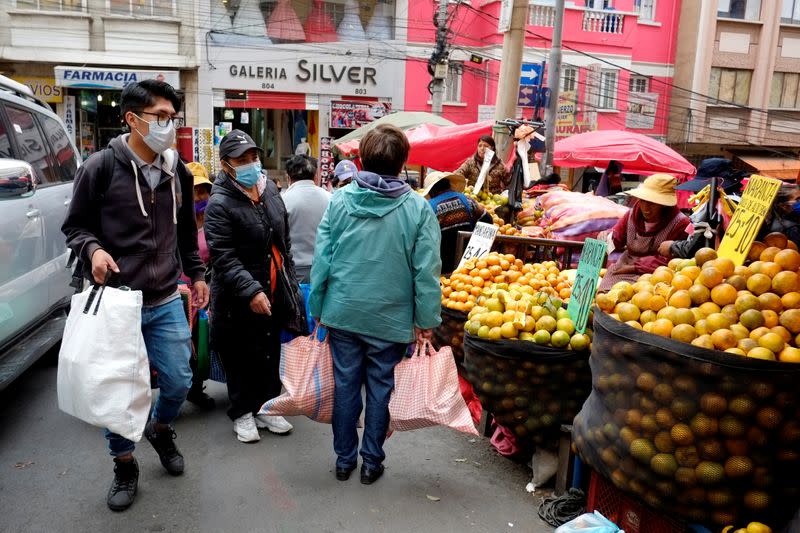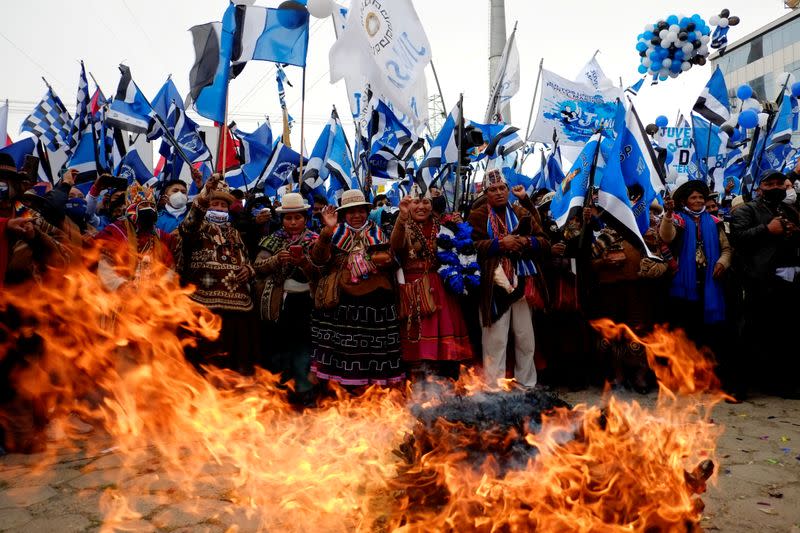'No more spilled blood': Bolivians wary of election violence with country at crossroads
By Marcelo Rochabrun
LA PAZ (Reuters) - Bolivians in wealthier areas of La Paz have begun stocking up on essential supplies and queuing up to buy gas ahead of Sunday's presidential election, fearing a return of deadly clashes that followed a fraught ballot last year.
That vote, since voided, led to the resignation of long-term leftist leader Evo Morales and tipped the country into a precarious political vacuum, with an unelected conservative interim government in charge since.
Bolivia's 7.3 million voters now face a crossroads as the country reels from the coronavirus pandemic: a return to Morales' socialist party or a pivot to centrist Carlos Mesa, a former president who came second in 2019.
Many, however, simply want to avoid the bloodshed of last year, which saw at least 30 people killed.
"I want peace. No more trouble. We don't want more blood spilled. No blood from any political party," said Sandra Rivero, whose relative Marcelo Terrazas died last year in the violence.
The Oct. 18 vote is a delayed re-run of the 2019 ballot. Socialist party candidate Luis Arce, a close Morales ally, is leading in opinion polls against Mesa, though seemingly not by enough to avoid a second round run-off, which would be on Nov. 29.
Voting, which will be in person with health protocols due to the coronavirus pandemic, will open on Sunday morning, with the first results due around 8pm local time (midnight GMT).
Administrative capital La Paz is a city starkly divided by class and race. The richer and whiter live in the lower part, founded by Spaniards at an altitude where oxygen is friendlier and the temperature is warmer. The more you climb, the poorer it gets.
In the affluent Zona Sur, drivers waited as long as an hour to fill their tanks on Friday and WhatsApp groups were filled with frantic coordination of security measures.
"People suffered a lot last year," said Freddy Chipunavi, a butcher in the middle-class Collasuyo market, adding he had sold 70% more beef in the past few days as clients feared a return of the food shortages that hit last year as roads were blockaded.
"It might not be like that this year, but people are preparing."
'ANYTHING CAN HAPPEN'
Many Bolivians criticize Morales for holding on too long to power and attempting to bypass constitutional limits. Others say he was ousted in a coup and his party have warned of a repeat, stoking tensions during a bitter campaign.
United Nations High Commissioner for Human Rights Michelle Bachelet, a former Chilean president, said in a statement on Friday that no-one wanted to see a repeat of the "extensive human rights violations and abuses" of 2019.
"It is essential that all sides avoid further acts of violence that could spark a confrontation," she said.
A Western diplomat in Bolivia said the mood was "nervous" and there was a lot of uncertainty, given the amount of undecided voters.
"I think anything can happen this time. Lots of fears for a repeat of violence and protests once the results come out," the diplomat said.
A senior official from the U.S. State Department said the vote was "a critical moment for democracy in Bolivia" and that the United States was open to working with whoever was elected and had urged all those taking part to let the electoral process play out and accept the results once confirmed.
Marisol Rodriguez, a representative of a group of victims of the 2019 violence, said whoever won the vote needed to find a way to bridge the sharp divides in the country.
"The only thing I am hoping for with these elections is that the person who wins has feelings and is someone who listens to the Bolivian people," she said.
(Reporting by Marcelo Rochabrun; Additional reoorting by Reuters TV and Daniel Ramos; Writing by Adam Jourdan; Editing by Rosalba O'Brien)



